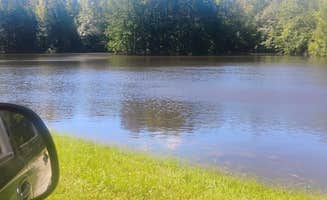Joe Kurz Wildlife Management Area offers rustic camping near Atlanta, Georgia, approximately 50 miles southwest of the city. This 3,500-acre conservation area serves primarily as a managed hunting zone during designated seasons, with specific areas set aside for primitive camping. The region features rolling piedmont terrain with mixed hardwood forests and small bodies of water that support local wildlife populations.
What to do
Fishing opportunities: The pond at Joe Kurz Wildlife Management Area attracts anglers year-round. "No cell coverage, has fire pit, mostly tent and car campers. I went with a travel trailer," notes Lenear B., highlighting the primitive nature of the experience.
Wildlife observation: During non-hunting seasons, the area provides opportunities for wildlife photography and bird watching. The management area maintains several cleared observation areas accessible by foot trails. Visitors should wear appropriate footwear as trails can become muddy after rainfall.
Seasonal hunting: The primary purpose of this land is for regulated hunting. "Ahead of my trip to Joe Kurz Wildlife Management Area(WMA), I've gathered crucial details for anyone looking to explore this serene destination," writes Lonnie B., emphasizing that visitors should "be aware of the active hunting seasons, indicating times when the WMA is frequented by hunters."
What campers like
Secluded environment: The absence of facilities creates a truly primitive outdoor experience for those seeking minimal-impact camping near Atlanta. The camping area sits away from major roads, providing genuine quiet rarely found in more developed campgrounds.
Night sky viewing: Without nearby light pollution, the area offers excellent stargazing opportunities on clear nights. Campers should bring red-light flashlights to preserve night vision while navigating camp after dark.
Self-sufficiency: Experienced backcountry campers appreciate the lack of infrastructure and oversight. The management area requires visitors to practice true leave-no-trace camping with complete pack-in, pack-out responsibility for all supplies and waste.
What you should know
License requirements: A valid Georgia hunting or fishing license serves as your camping permit. These can be purchased online through the Georgia Department of Natural Resources or at sporting goods retailers prior to arrival.
Zero facilities: There are absolutely no amenities or services available. Campers must bring sufficient water for drinking, cooking and sanitation. No restrooms, trash collection, or potable water exists on site.
Safety precautions: During hunting seasons, wearing high-visibility orange clothing is strongly recommended even when camping. Cell service is extremely limited or non-existent throughout the property, so emergency communication devices should be considered.
Tips for camping with families
Water activities: Children can explore the pond shoreline for tadpoles, frogs and small fish during warmer months. Bring water shoes as the banks can be muddy and contain hidden rocks or sticks.
Wildlife education: The management area provides educational opportunities about conservation and local ecosystems. Bring field guides for identifying native plants and animals to engage children in learning about their surroundings.
Weather preparation: The Georgia piedmont region experiences rapid weather changes, particularly in spring and fall. Pack additional layers and rain gear for children as temperatures can fluctuate significantly between day and night.
Tips from RVers
Access limitations: The primitive nature of the roads restricts access for larger recreational vehicles. Travel trailers under 20 feet generally navigate the entrance road successfully, but larger rigs may struggle with tight turns and uneven surfaces.
Leveling challenges: The designated camping areas lack formal parking pads or level surfaces. Bring additional leveling blocks and wheel chocks as the natural terrain may require significant adjustments for comfortable overnight parking.
Supply planning: With no services available, RVers must be entirely self-contained. Plan for proper waste management with sufficient holding tank capacity for your intended stay duration. Nearest dump stations are approximately 15 miles from the camping area in Pike County.


